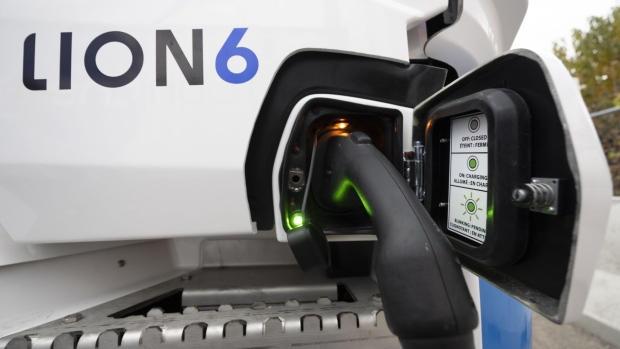May 8, 2024
Lion Electric Drops on Revenue Miss, Dwindling Cash Balance
, Bloomberg News

(Bloomberg) -- Shares of Lion Electric Co. fell as much as 10.5% after the electric vehicle manufacturer missed estimates for revenue and its cash balance dropped.
The Canadian company, which makes electric buses and trucks, said revenue was $55.5 million, well below the $69.4 million expected by analysts tracked by Bloomberg. It has been hurt by bottlenecks in a government program that helps public transit and school bus operators purchase new vehicles.
More than half of the vehicles in Lion Electric’s $475 million order book are tied to funding from the Canadian government’s Zero Emission Transit Fund, or ZETF. Delays and challenges with approvals in that program “continue to negatively impact the company’s scheduled deliveries and sales efforts,” Lion Electric said in a filing.
Its order book shrunk to 2,004 units, down about 3% from the end of February.
Some orders may be canceled or renegotiated if they’re not completed before the deadline for sending claims to the ZETF at the end of 2025, which is leading to uncertainty, National Bank Financial analyst Rupert Merer said in a note to investors. But the company may be able to boost orders through US Environmental Protection Agency grants and Quebec government subsidies for school buses, he added.
Merer downgraded his rating on the stock to underperform and lowered his price target to $1 on “elevated risk related to liquidity limitations and continued delays facing the ZETF program.” The shares were around 97 cents in mid-afternoon trading in New York, down nearly 7% from Tuesday’s closing price.
Lion Electric’s cash balance dwindled to $4.8 million from around $30 million at the end of December. The manufacturer, which is 34% owned by Montreal-based holding company Power Corp. of Canada, has been trying to address liquidity concerns. In April, it laid off 120 employees, following layoffs in February and August. It estimates that all of its recent cost-cutting measures will lead to $40 million in savings annually.
©2024 Bloomberg L.P.






